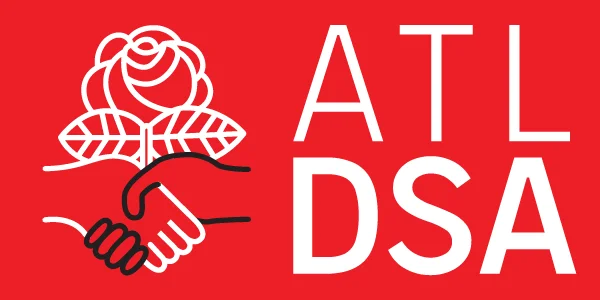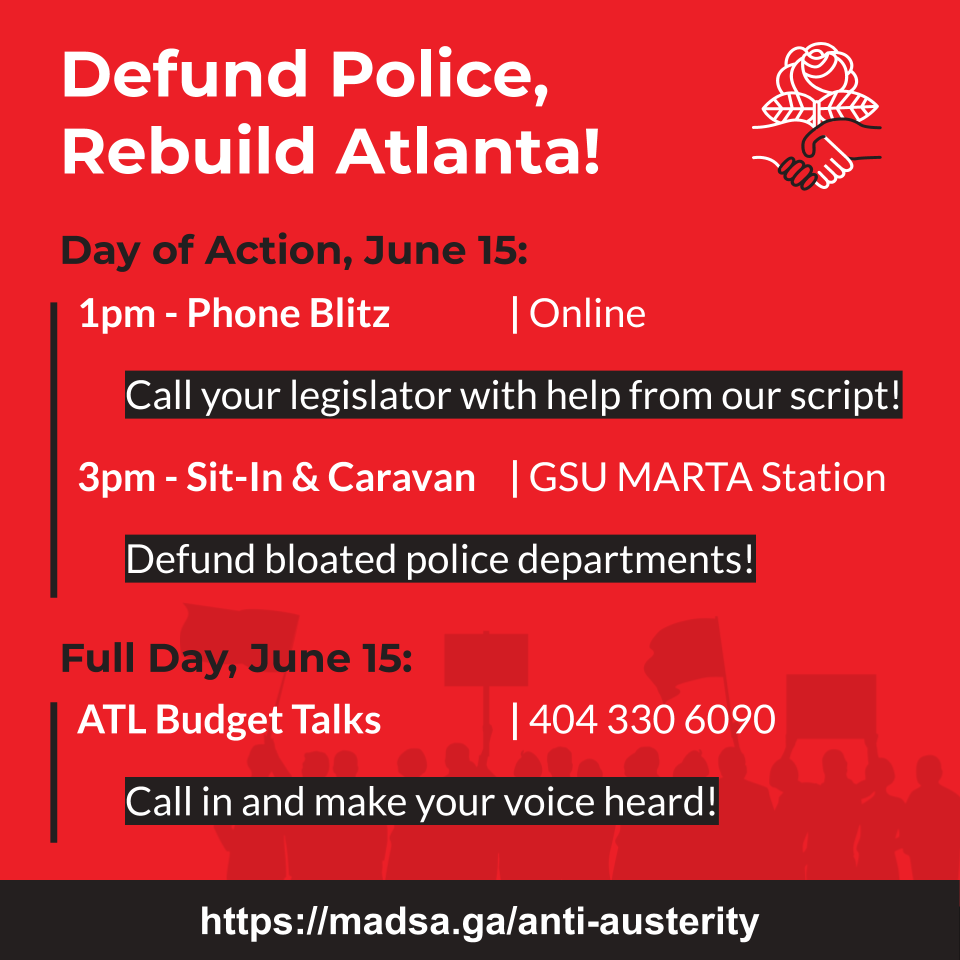

Marxism and the Struggle for Black Liberation
You can follow Hadas Thier on Twitter @HadasThier
Her book A People's Guide to Capitalism: An Introduction to Marxist Economics will be available this Summer. You can preorder it here:
https://bookshop.org/a/1039/9781642591699
Dragonfly's work can be found here: http://dragonflyness.com/
You’re listening to Revolution Per Minute on listener sponsored WBAI in NYC broadcasting at 99.5 FM and streaming on your favorite podcast app. To connect with us after the show you can email us at revolutionsnyc@gmail.com. You can find us on our website revolutionsperminute.simplecast.com or on twitter @nycRPM.


June 15 Day of Action
Defund Police! Protect Workers! Rebuild Atlanta!
Join us for a day of action against state budget cuts on June 15, 2020.
Governor Brian Kemp is calling on all state agencies to prepare for a 14% budget cut, but we think the State of Georgia and the City of Atlanta should keep cuts where they belong! Our schools, hospitals, and public services shouldn’t suffer when we’re spending too much on police cruisers, tanks, and riot gear. Tax the rich and defund the police!
This June 15 day of action is organized by Metro Atlanta DSA in collaboration with leaders and organizers from Atlanta-area unions and Black socialist groups.

Schedule for the June 15 Day of Action 
Scroll down for our full statement & list of demands.
June 15 Schedule & Action Items
1:00 PM
Phone blitz!
Call your legislator to demand a just state budget.Use our script!
3:00 PM
Downtown sit-in & caravan!
Let’s make some noise! If you’re walking and want to rally at the Capitol, meet at the GSU MARTA station, and if you’re driving, meet at Grant Park.
ALL DAY
Atlanta Budget Talks!
Call (404) 330-6090 and demand that the City of Atlanta defund the police. Use our script!
Our Full Statement
As a result of the COVID-19 pandemic and consequent recession, Governor Brian Kemp released a statement on May 1st calling on all state agencies to prepare for a 14% budget cut in the 2021 fiscal year [5]. Historical experience has taught us that these cuts often disproportionately harm our most marginalized communities. Alternatively, investment in public necessities including healthcare, affordable housing, education, and transportation would help protect all residents of our state.
The burden of Kemp’s proposed cuts will directly contribute to deepening poverty and weakening the working class’s ability to recover—specifically in low-income communities, rural regions of the state, immigrant families, and Black communities. Rather than slashing funding for the services that millions depend on for life, we call on the state of Georgia to put our most marginalized citizens first by taking a more equitable, just, and humanistic approach to balancing the budget.
More recently, in response to protests demanding justice for Black lives like George Floyd, Breonna Taylor, and Ahmaud Arbery, Atlanta Mayor Keisha Lance Bottoms has failed to protect Atlantans, opting instead to lead a police occupation of the city. As Georgians struggle to pay rent, hold jobs, and afford healthcare, our leaders have poured money into a deadly, racist police and prison system and handouts to employers and landlords.
While our people suffer, like furloughed service workers at Hartsfield-Jackson Airport left without healthcare or job security [1], our state and local governments respond with tax cuts and subsidies for Georgia’s wealthiest corporations [2]. Our governments have spent enormous resources to protect the ultra-wealthy, at often violent cost to the communities they exploit for profit.
We call on the people of Georgia to join us and refuse any budgets that erode our public schools, hospitals, food access, safe housing, and other vital public services without first cutting from Georgia’s violent carceral systems and its subsidies for the capitalist class.
Instead of a broken, racist system that treats essentials as commodities reserved for those who can pay, Metro Atlanta DSA calls for a just budget that protects the crucial public services that our people depend on.
Our Demands
We demand that the City of Atlanta:
- End the police occupation of Atlanta, keep the curfew lifted, defund the Atlanta Police Department, and close the Atlanta City Detention Center. Reinvest recovered funds in Black communities and restorative community programs;
- Adopt the demands of Unite Here Local 23 [1], including guaranteeing recall rights for workers at Hartsfield-Jackson Airport for 36 months and guaranteeing healthcare for all furloughed workers;
- Adopt the demands of Black movement organizations in Atlanta [4], including a moratorium on books and arrests for minor offenses, a moratorium on rent, mortgage, utilities, evictions, and parking payments; emergency housing for people without homes, the immediate release of those incarcerated in the Atlanta City Detention Center and providing those released with housing, transportation and other services as needed; and the reduction of police presence in highly vulnerable neighborhoods.
We further call on the State of Georgia specifically to:
- Keep the National Guard out of Georgia;
- Immediately end the drug war in Georgia, beginning with legalizing marijuana and immediately commuting related sentences;
- Move to end mass incarceration as well as the spread of COVID-19 by dramatically reducing the number of people incarcerated in Georgia, including in county and city jails, and ensure those released have access to the health, financial, transportation, and other resources needed to successfully transition out;
- End all special tax privileges, exemptions, and loopholes for large corporations and the rich, such as the costly film tax credit;
- Adopt the anti-austerity demands of the United Campus Workers of Georgia [3], aimed at reducing harm to working-class and marginalized employees, including mandating that any pay cuts or furloughs must begin with the highest-paid public employees and must be made on a progressive basis, with those of the highest earnings giving up a larger percentage of their salary or taking more furlough days;
- No layoffs, program closures, or department closures for state employees, or employees working for state-subsidized business, excluding the police.
Much of the catastrophe resulting from COVID-19 was avoidable, and the severity of its impact is directly tied to the injustices of capitalism. As socialists, we reject an order that places private property and wealth above human life and dignity.
We will not be sacrificed for billionaire profits!
References
[1] Unite Here Local 23 represents airport service workers and hotel workers across the country, including at Atlanta’s Hartsfield-Jackson International Airport, which has placed its concessions workers on recall without healthcare; https://www.unitehere23.org/updates-victories-and-news-coverage/
They have a petition of demands, addressed to Mayor Bottoms, here.
https://actionnetwork.org/petitions/economic-essentials-for-atlantas-airport-concession-retail-workers
[2] GBPI estimates that Georgia gives $9.8 billion per year in tax breaks for special interests, that setting the tobacco tax at the national average would raise $600 million per year, and that closing an itemized tax deduction loophole for high earners would generate $175 million per year; https://gbpi.org/2020/georgia-cant-afford-another-lost-decade-options-to-increase-state-revenues-to-close-budget-shortfalls/.
GBPI also reports the state has nearly $1.3 billion in lottery reserves, which could fund shortfalls in HOPE college programs as well as Pre-K; https://gbpi.org/2020/unused-lottery-funds-available-to-support-more-affordable-access-to-college/.
[3] The United Campus Workers of Georgia represent workers at higher education campuses across the University System of Georgia. https://www.ucwga.com/news/ucwga-calls-compassion-response-14-budget-decrease
[4] Many organizations form The Peoples’ Response Atlanta, a collective of concerned citizens and community organizers calling for an adequate response to the COVID-19 pandemic and resultant economic crisis from Mayor Bottoms. You can read their demands here: www.bit.ly/DearKeisha or https://wearyourvoicemag.com/peoples-response-atlanta-coalition-mayor-keisha-lance-bottoms/
[5] Recent reports indicate that the budget cuts have been revised down to 11%.


Statement on police violence and nationwide uprisings for justice
The North Carolina Piedmont chapter of the Democratic Socialists of America strongly and unequivocally supports the nationwide uprising for justice for Ahmaud Arbery, Akiel Denkins, George Floyd, Tony McDade, Nina Pop, Breonna Taylor, and the countless Black victims of white supremacist violence and the police state.
We stand in solidarity with the Black Lives Matter and police abolitionist movements throughout the Triangle and the United States. We condemn the police-instigated violence, including the use of chemical weapons like tear gas, and the violent arrests of demonstrators perpetrated by the Raleigh Police Department and State Capitol Police. We will continue to offer our support and join in the streets with all antiracist groups in the Triangle combating police violence, racism, and white supremacy. We also believe there is no such thing as looting by the oppressed, when we live in a land stolen from indigenous peoples and built by slaves. As anti-capitalists, we know that the real looting is done to working people by their bosses and a government that rules in the interests of those bosses.
As a democratic socialist organization, we fight for police and prison abolition because we know cops and cages don't keep us safe: we keep us safe. Toward these goals, we call on Wake, Durham, and Orange Counties and their constituent municipalities to: 1) demilitarize and defund their police forces; 2) empty their jails and prisons, which are hotspots in a pandemic that is already killing Black, Brown, and poor people disproportionately; 3) end cash bail; and 4) reappropriate funds from the police toward health care, housing, and other life-affirming social services that truly allow our communities to thrive. We will continue to support the leadership and organizing of formations like Durham Beyond Policing and Raleigh PACT, which have already made significant progress toward divesting from police and investing in communities of color.
We share the rage of all those who are making themselves heard on the streets after years of being suffocated by policing and poverty, after years of being looted by corporations, landlords, and billionaires. We will fight for a world where Black people can breathe freely. As socialists, it is our duty to fight for prison abolition, dismantle white supremacy, and build a just and liberated world.


PRESS RELEASE: BERKSHIRES DSA STANDS IN SOLIDARITY WITH BLACK LIVES MATTER
For Immediate Release
June 8, 2020
PRESS RELEASE: BERKSHIRES DSA STANDS IN SOLIDARITY WITH BLACK LIVES MATTER
Pittsfield, MA —
George Floyd.
Breonna Taylor.
Tony McDade.
Three Black individuals murdered by the police. Three among thousands.
Police violence stops here. Racism stops here.
The Berkshires chapter of the Democratic Socialists of America (DSA) proudly adds our voice to the global chorus: BLACK LIVES MATTER.
We join our comrades in the streets to protest police violence and the racist order it upholds. For us, the struggle for racial justice is inseparable from the struggle for democratic socialism. We seek a world defined by our lasting commitment to each other rather than the fleeting economic value of our labor. And we will defend the vision of democratic socialism against racists, and against fascists. Right now, that means we find ourselves in the streets.
At this moment, the path to democratic socialism brings us head-to-head with anti-Black racism. We do not shy away from this confrontation, and we call on our members to join the protests unfolding across Berkshire County, and worldwide. We invite all residents of Berkshire County to join us in the streets, and we call on elected officials to support racial justice by demanding greater police accountability and by redirecting resources from the police to public programs that serve Black and Brown communities.
The DSA is the largest socialist organization in the United States. DSA’s members are building progressive movements for social change while establishing an openly democratic socialist presence in American communities and politics. We believe that working people should run both the economy and society democratically to meet human needs, not to make profits for the few. DSA members use a variety of tactics, from legislative to direct action, to fight for reforms that empower working people.
For media Inquiries, please contact Amillie Coster (413) 854 5611, amilliedelphina@gmail.com




Food Resources in Little Rock and North Little Rock
Little Rock
Bullock Temple
1513 South Park Street, Little Rock, AR 72202
501-375-1581
Monday 1:00 – 2:00pm; Thursdays 4:30-6:00 pm
Appointments preferred, ID required
Little Rock
Christ Temple Outreach Center
1919 South Arch Street, Little Rock, AR 72206
501-376-1664
Tuesday & Thursday 10:00am – 12:00noon
Little Rock
Church at Rock Creek
11500 West 36th Street, Little Rock, AR 72211
501-221-1051
Open Tuesday, thru Friday
Call in the mornings between 8:00 & 10:00am to schedule an afternoon appointment. Services available for each person/family at intervals of 5-weeks, 1 service per household. Serving Little Rock and Saline County residents ONLY
Little Rock
El Zocalo Immigrant Food Pantry
5500 Geyer Springs Road, Little Rock, AR 72209
501-301-4652
Inside Geyer Springs United Methodist Church www.zocalocenter.com El Zocalo Immigrant Food Pantry organized by El Zocalo and Interfaith Arkansas. 1 box of food per month for lowincome immigrant families or families affected by immigrant detention. No ID necessary.
Little Rock
Geyer Springs United Methodist Church
5500 Geyer Springs Road, Little Rock, AR 72209
501-565-3175
1st & 3rd Thursday 9:00am – 12:00noon
Serves residents of the 72206, 72209 & 72103 Zip Code area ONLY. Photo ID required.
Little Rock
Greater Second Care Center
5615 Geyer Springs Road, Little Rock, AR 72209
501-569-998
Open third Wednesday 10:00am – 12:00noon
www.greatersecond.org
Little Rock
Helping Hand of Greater Little Rock
1601 Marshall Street, Little Rock, AR 72202
501-372-4388
Monday thru Thursday 9:00am – 12:30pm
May only access food once each month. Food and inexpensive thrift store clothing available. Photo ID required.
Little Rock
Immanuel Baptist Church
10500 West Markham Street, Suite #107, Little Rock, AR 72211
501-376-3071
Tuesday 10:00am – 2:00pm
ID and proof of residence required. For children, must provide proof of guardianship.
Little Rock
Lakeshore Drive Baptist Church
21 Lakeshore Drive, Little Rock, AR 72204
501-565-5536
2nd and 4th Tuesday of each month 10:00am – 2:00pm
Serving the 72204 Zip Code area ONLY www.facebook.com/LakeshoreLittleRock/?rf=113369145364049
Little Rock
Liberty Hill Baptist Church
1215 South Schiller, Little Rock, AR 72202
501-374-8060
2nd Monday, 3:00pm – 6:00pm
www.libertyhbc.org
Photo ID Required
Little Rock
Little Rock Church
10701 West Baseline Road, Little Rock, AR 72209
501-4550900
Open every other Monday 4:30 – 6:30pm
Little Rock
Little Rock Compassion Center
3618 West Roosevelt, Little Rock, AR 72204
501-296-9114
Tuesday and Thursday 8:00 – 11:00am
Photo ID required. Serving the 72204 Zip code area only
Little Rock
Mosaic Church of Central Arkansas
6221 Colonel Glenn Road ad, Suite #A, Little Rock, AR 72204
501-5623336 (Bilingual )
Tuesday 2:00 – 3:30pm, must be from 72204 area, 1st come 1st served
Little Rock
Mount Zion Baptist Church
924 Cross Street, Little Rock, AR 72202
501-374-5832
Wednesday 11:00am – 2:00pm & Saturday 10:00am – 12:00noon.
Little Rock
Oak Forest United Methodist Church
2415 Fair Park Blvd., Little Rock, AR 72204
501-663-9407
1st and 3rd Thursday 11:00am – 1:00pm
Little Rock
Pulaski Heights United Methodist Church
4823 Woodlawn Drive, Little Rock, AR 72205
501-664-3600
Open first Wednesday morning of each month at 8:30am
www.phumc.com
Little Rock
Quapaw Quarter United Methodist Church
1601 South Louisiana Street, Little Rock, AR 72206
501-375-1600
Groceries are distributed between 1:00 – 3:00pm on the first and third Tuesdays of each month, except August.
www.umc.org/find-a-church/church/62626
Little Rock
Second Baptist Church
1709 John Barrow
501-223-2323
Wednesdays & Thursdays
Photo ID and utility bill required to have matching name & address.
10:00am – 12:00noon
Little Rock
St. Francis House
2701 South Elm Street, Little Rock, AR 72204
501-644-5036
Monday thru Friday 8:30am – 11:30am & 1:00pm – 3:00pm
Must provide photo ID, Social Security card for each recipient.
Little Rock
St. John Missionary Baptist Church Unto Others Food Pantry
2501 South Main Street, Little Rock, AR 72206
501-537-8658
Open the 2nd & 4th Thursday of each month, 9:00am – we run out
Must complete application, photo ID Required. During winter weather months open only once a month.
Little Rock
St. Mark’s Episcopal Church Food Pantry
1500 North Mississippi Street, Little Rock, AR 72207
501-225-4203
Thursdays, 9:15 – 10:45am
Photo ID required
http://st-marks.com/serving/st-marks-food-pantry
Little Rock
Temple Baptist Church – Food Pantry
10710 Interstate #30, Little Rock, AR 72209
501-565-4966
1st & 3rd Monday of each month 6:00pm
Must register with the food pantry with each use.
Little Rock
The Van
P.O. Box #250061, Little Rock, AR 72225
501-955-3444
www.theoneinc.org
Mobile homeless services, locating and serving unsheltered homeless on the fringes of Little Rock. Provides: Clothing, Food, Meals, as well as sundries and materials to enhance basic living conditions
Little Rock
Union A.M.E. Church Food Pantry
1825 South Pulaski Street, Little Rock, AR 72206
501-374-3528
2nd Wednesday of each month, 1:00 – 3:00pm
Call to confirm time
www.unionamec.com
Little Rock
Watershed
3701 Springer Blvd., Little Rock, AR 72206
501-378-0176
Monday thru Friday 8:00am – 4:00pm
Call before coming to make sure food is available. Appointments and referrals are preferred. Social Security card or number is preferred. Must have photo ID.


Shelters in Little Rock and North Little Rock
Immerse Arkansas
PO Box 45385
Little Rock, AR 72214
501-404-9890
Email: help@immersearkansas.org
https://www.immersearkansas.org/youth
Youth ages 16-22
Provides supportive housing for youth ages 16-22 who are aging out of foster care, runaway, or homeles, or victims of sex trafficking or sexual exploitation
Mid AR Substance Abuse in LR, AR
4601 W. 7th Little Rock, AR 72205
501-686-9393
Shelter for the indigent and others who need detox
St. Francis House
2701 S. Elm Little Rock, AR 72204
501-6645036
Homeless veterans program http://www.stfrancisministries.com/
Union Rescue Mission Dorcas House
823 S. Park Street Little Rock, AR 72202
501-374-4022
Outreach to women and children begin at Dorcas House. We provide services like food, shelter, clothing and crisis intervention. https://urmissionlr.org/dorcas-house/
PATH- Partners against Trafficking Human
PO BOX 21066 Little Rock, AR 72221
501-301-4357
Provide safe housing and a program of restoration and reintegration for rescued victims of Human Trafficking and prostitution. pathsaves.org
Gaines House
1702 Gaines Street Little Rock, AR 72206
501-376-7922
Transitional living shelter for women 18 or older who have been treated for mental, physical or emotional disabilities http://www.gaineshouse.org/
The Salvation Army Shelter
1111 W. Markham Little Rock, AR 72201
501-374-9296
Single men, single women and family shelter. 5 free nights per month
Family Promises of Pulaski
222 East 8th Street Little Rock, AR 72202
501-372-0733
Provide shelter, food, transportation and case management for homeless families with children under 18. www.familypromisepc.org
Jericho Way Day Center
3000 Springer Blvd Little Rock, AR 72206
501-916-9859
M-F 7:30am -3 pm
Homeless day center, clothing closet
http://www.depaulusa.org/our-programs/little-rock-ar/
A.B.B.A. House
1002 South Oak St. Little Rock, AR 72204
501-666-9718
Provides shelter for homeless and/or pregnant women, Non-pregnant woman can stay up to 3 wks., pregnant woman can stay up to 1 month after the child is born, NO drug problems or mental illness.
Center for Youth & Families, Youth Emergency Shelter
6425 W. 12th St. Little Rock, AR 72204
501-666-7233
Shelter for homeless and runaway youth, ages 8-18, wheelchair accessible, children may stay up to 45 days. Must be a DHS client.
Dorcas House
823 South Park St.
501-374-4022
Women’s domestic Violence Program
9-month program for women and children
A division of Union Rescue Mission
Little Rock, AR 72202
Children in domestic abuse situations, male children allowed through 17 years of age (on a space available basis). 50 beds available for women and children. Recovery Program: 9 month recovery program for women with substance or alcohol addiction. Children are NOT permitted to remain with women in Recovery Program. Wheelchair accessible.
Empowerment Village
3604 W. 12th St. Little Rock, AR 72204
501-663-7223 Ext. #210
For Arkansans with special needs, i.e.: limited income, homeless or has disability affecting their income and need for supportive services.
Little Rock Compassion Center (Men’s)
3618 W. Roosevelt Rd., Little Rock, AR 72204
501-296-9114
Men’s homeless shelter must have ID and be over 18. Must be sober, no medical services available.
Little Rock Compassion Center (Women’s)
4210 Asher Ave. Little Rock, AR 72204
501-663-2972
Women’s homeless shelter must have ID and be over 18. Check-in 3:00pm.
Nehemiah House, A Division of Union Rescue Mission
2921 Springer Blvd, Little Rock, AR 72216,
(501) 374-1108
Men’s homeless shelter, 4-free days per month, free if the weather is below freezing, after that $6.00 per day (includes breakfast and dinner.) You must be out of the building daily by 7:00am. Once in at night you cannot leave and re-enter. Weapons, tobacco, cell phones, drugs and alcohol not permitted on the property. Work Program – 36-bed facility for working homeless – This program is 6 months and for the working homeless. Recovery Program – 46 bed facility – 9-month recovery program that is faith based in nature. Wheelchair accessible
Our House
https://ourhouseshelter.org/
302 East Roosevelt Road, Little Rock, AR 72206,
(501) 375-2416 / (501) 374-7383
Working shelter for men, women, and families, wheelchair accessible, long term shelter available (up to 2-years). Many educational programs, meals, clothing and classes available, domestic violence recovery. Must be working a minimum of 32 hours a week soon after moving in.
Phoenix Recovery Center
104 North Battery, Little Rock, AR 72205,
(501) 725-4907
Transitional housing for women only.
Salvation Army
1111 West Markham, Little Rock, AR 72201,
(501) 374-9296 / (501) 374-8636 After 3:30pm
Emergency shelter for women, and families, opens at 6:15pm.
Union RESCUE Mission Transient Lodge
615 Magnolia N. Little Rock, AR 72114
501-376-8470
Homeless Shelter for Men. Can stay up to 5 nights.
Firm Foundation Ministries
2200 East Broadway North Little Rock, AR 72114
501-945-7412
Men’s homeless shelter and half way house


Resolution to Prohibit Police Presence in CLTMDSA
As voted on at the June 7th Meeting of the Charlotte Metropolitan Democratic Socialists of America, the voting body has adopted the the following resolution:
Therefore, be it resolved, employment as a law enforcement officer is in opposition to the principles of the organization as outlined in DSA constitution article II. “Law Enforcement officer” shall be defined as “an individual who is sworn, badged, and arm-able by the government to enforce the law, or a prison guard; or individuals who are members, operators, or supporters of police associated union organizations”(Whether employed by the government or a private company). Persons employed as law enforcement are therefore excluded from membership in Charlotte Metropolitan DSA. Whereas, law enforcement agencies operate to promote the interests of capitalist institutions and to suppress organized dissent against their control of American society; and Whereas, oppressed groups with whom the DSA seeks to organize such as people of color, sex workers, and the homeless have immediate reasons to be afraid of the police, and uncomfortable in their presence.


Columbus DSA Statement on Police Unions
The last eight days witnessed the single greatest national explosion of popular unrest since the summer of 1968. Hundreds of thousands of protesters of all races and generations gathered around the world to demand justice for the murder of George Floyd in Minneapolis on 25 May and to demand an end to police brutality and racism more broadly. The vicious response most protesters received — and continue to receive in ongoing demonstrations — at the hands of those sworn to “protect and serve” only proves the urgent necessity of their demands.
The history of workers’ struggles in the United States is punctuated by the constant antagonism of policing — whether municipal, state, federal, or private armies of thugs like the Pinkertons. No matter the place, no matter the era, no matter the industry, police have served as aggressor against workers’ organizing efforts and bulwark protecting the interests of property and capital.
Simultaneously, police have served to uphold the racial hierarchy imposed upon people of color by the white supremacist ruling class by aiding, abetting, and directly participating in all conceivable forms of subjugation and oppression. Moreover, in the century since its founding the Fraternal Order of Police (FOP), the country’s largest police union, has worked tirelessly to shield those police officers guilty of crimes against communities of color and to stamp out dissent or efforts to reform from within.
In Columbus, the historical narrative is no different from the rest of the country. Here too, Black, Indigenous, and People of Color struggle against a repressive and overwhelmingly white police force that disproportionately targets them for harassment, arrest, and murder. Here too, the police are shielded from accountability by their union.
According to its website, FOP Capital City Lodge #9 is the fifth-largest union local in the country, representing more than 4,000 members and 29 law enforcement agencies throughout Franklin County. In the past eight days, hundreds — if not thousands — of those members have been mobilized against the public in a shocking display of unrestrained malice. Mace, pepper balls, rubber and wooden bullets, tear gas, shield and batons have all been wielded with impunity against peaceful protesters who had the gall to demand accountability from nominally public servants. On the night of 31 May, for instance, the police were so proud of their handiwork, they congregated for a group photo in the middle of a cleared intersection. These are not the actions of workers, let alone the actions of union siblings.
As workers of Columbus, the site of the 1886 founding of the American Federation of Labor (AFL), we deeply feel the twisted irony of being home to the 11th-most murderous police force in the country. As socialists, we believe in the power of workers, in fostering bonds of solidarity among workers through the shared struggle of organizing, in the battles workers wage against capital to build and exert their collective power. As moral human beings, we believe in the full emancipation of BIPOC and the destruction of white supremacy. At every turn, police stand against these interests.
Police unions are a blight on the labor movement. They ignore calls for reform and scoff at pleas for solidarity. They are the enemy of workers and BIPOC communities everywhere. They are scabs, pure and simple.
Columbus DSA hereby calls on FOP Capital City Lodge #9 President Ferrell, Executive Vice President Simpson, and Vice President Steel to immediately resign. We call on the State House to pass legislation stripping police unions of the right to collectively bargain. We call on all municipalities of Franklin County to demilitarize and defund their police departments, and to reappropriate existing “public safety” funding toward more critical sectors and infrastructure like public education, public housing, and public transportation.
Further, we call on the AFL-CIO to immediately expel the International Union of Police Association (IUPA) from the federation and to sever all ties with police and prison guard unions. They are not siblings. They do not deserve the union privileges they actively help deny workers everywhere.
These are merely the first steps towards building a future safe for BIPOC communities and for workers of all colors, backgrounds, and industries. A better world is possible!
In Solidarity,
Labor Working Group
Columbus DSA


Chief Evans Defends BCPD

In an interview with the Gavel, BCPD Chief Evans DEFENDED sending BCPD officers to Franklin Park Tuesday evening. Roxbury and Dorchester are majority Black neighborhoods of Boston. Under no circumstance should BCPD be doing anything, ever, in Roxbury or Dorchester. Particularly not policing a protest against police brutality.
Evans says sending officers to police the protest is”by no means political” This is outrageous. Sending police to oppose protesters at a rally against police brutality and the murder of Black people by police is absolutely political. Boston College must immediately end any involvement in policing protests in Boston. YDS of BC reiterates our call for Evans to resign or be removed as Chief of the Boston College Police department. No institution that employs him has any concern for systematic racism of the police or the criminal justice system. All the statements in the world cannot outweigh his presence on BC’s campus.
Petition to remove Evans can be found here.


